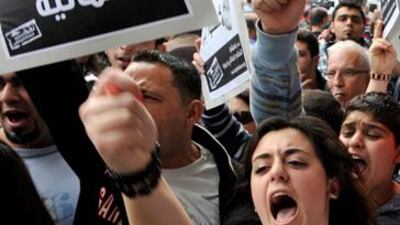BEIRUT // When thousands of Lebanese marched through their capital at the weekend, many were holding up banners bearing the words that have been repeated across the Arab world: "Ashaab ureed isqaat al nitham".
The phrase - "the people want the fall of the system" - was emblazoned on signs, and the crowd chanted the slogan, the one that has recently echoed around the region from Tunisia to Egypt, Bahrain and Libya.
But, for the Beirut demonstrators the "regime" they want to collapse is the country's system of confessionalism. They want a secular state.
Lebanon is governed by a delicate system of power-sharing along religious lines, aimed at maintaining balance among the country's 18 religious sects. The agreement, which dates back to the country's independence from France in 1943, mandates that the president be a Maronite Christian, the speaker of the parliament a Shia, and the prime minister a Sunni.
Sunday's marchers believe the partisan system has caused divisions and conflict, bred corruption and led to ineffective governance. However, Arabi el Andari, one of the activists organising the demonstrations, stressed that they hope to see more change than just the end of sectarian governance.
"The general demand is to take out the whole system of confessionalism," he said, citing problems ranging from the division of power to institutions established for certain sects and the absence of civil marriage in the country.
"We are saying that the whole infrastructure has to be dismantled. In the long-run we want to remove sectarianism from society. We don't want this system and we need a huge voice saying that."
The movement's first protest, held late last month, was attended by just a few hundred people. But last Sunday's demonstration brought out about 10,000 people, who marched from the neighbourhood of Dora towards the state electricity authority, which is seen as an example of poor government services. Power cuts are a daily occurrence.
Farhad Barkal, 28, an IT programmer, said: "I'm here because this government took everything from us - our money and our freedom. We want a system where you can vote for anyone, not based on religion."
Nearby, Aliya Khalidi, 47, and her 10 year-old-son Hani walked with the crowds. "We've had enough of sectarianism - this parliamentary system has to be abolished," she said. "We have to be able to elect who we want. After Tunisia and Egypt, it's enough."
Jameel Fouaneh, his wife and two daughters travelled from the Bekaa region to take part in the anti-sectarian march. Mr Fouaneh, who works in Beirut, said he wants a government that will provide better jobs and opportunities.
"There are no jobs in the Bekaa, that's why I work in Beirut," said Mr Fouaneh, 40, a construction worker. "We want a different system."
Nathalie Mukahal, 15, came to the protest with her mother and brother. "I think teenagers are among the most affected [by this system] because we are the future and we must learn in a country that is peaceful," she said.
The demonstrations come at a time of great uncertainty in Lebanon, which is still without a government after Saad Hariri's cabinet collapsed in January.
Nejib Mikati, the prime minister designate, is working to form a new government, while the country also waits for the imminent release of indictments by the Special Tribunal for Lebanon into the assassination of former prime minister Rafik Hariri.
Sunday's demonstration was small in comparison to the mass uprisings elsewhere in the region, but the organisers - leftist and youth activists as well as regular citizens who say they want change - hope to stage similar protests around the country every Sunday.
These are not the first calls for an end to thee sectarian system. But the current demonstrations appear to be buoyed by the insurrection sweeping the Arab world.
"There is now a higher level of hope that something can be done," said Mr el Andari, 37. "Something definitely came up with the victories of the Tunisians and Egyptians, that people can do something."
Nevertheless, Hilal Khashan, a political-science professor at the American University of Beirut, dismissed the efforts as largely insignificant.
"This is a thoroughly confessional country," he said. "The Lebanese government can fear anything except a movement to end confessionalism. Nobody is really taking this seriously; it's an intellectual activity."

